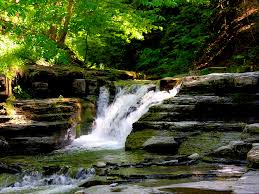记忆方法
记忆单词“brook”可以使用以下简单方法:
想象一个“小”(brook的“bro”暗示小)的“水”(“-ook”可以联想到水流声)在山谷中流动,这就是“brook”——小溪。
想象一个“小”(brook的“bro”暗示小)的“水”(“-ook”可以联想到水流声)在山谷中流动,这就是“brook”——小溪。
以上内容由AI生成, 仅供参考和借鉴
中文词源
brook 小溪
词源不详,可能来自break, 分开。
英语词源
- brook
-
brook: [OE] There are two distinct words brook in English. The one meaning ‘stream’ is comparatively isolated; it apparently has relatives in other Germanic languages (such as German bruch), but they mean ‘swamp’, and there the story ends. The now rather archaic verb brook, however, meaning ‘stand for, tolerate’, can be traced right back to an Indo-European base *bhrug-, from which English also gets fruit and frugal.
Its Germanic descendant was *brūk- ‘use’, which has given rise to a range of current verbs in the Germanic languages, including German brauchen ‘use, need’. The Old English version was brūcan, which also meant ‘use’. A particular application to food (‘use’ in the sense ‘eat’, and later ‘be able to digest’) started to develop in the late Old English period, and by the 16th century this had come to be used more generally (rather like stomach) for ‘tolerate’.
=> frugal, fruit - brook (n.)
- "small stream," Old English broc "flowing stream, torrest," of obscure origin, probably from Proto-Germanic *broka- which yielded words in German (Bruch) and Dutch (broek) that have a sense of "marsh." In Sussex and Kent, it means "water-meadow," and in plural, "low, marshy ground."
- brook (v.)
- "to endure," Old English brucan "use, enjoy, possess; eat; cohabit with," from Proto-Germanic *bruk- "to make use of, enjoy" (cognates: Old Saxon brukan, Old Frisian bruka, Old High German bruhhan, German brauchen "to use," Gothic brukjan), from PIE root *bhrug- "to make use of, have enjoyment of" (cognates: Latin fructus). Sense of "use" applied to food led to "be able to digest," and by 16c. to "tolerate."
权威例句
- 1. Ahead, he saw the side railings of First Bridge over Crooked Brook.
- 他看见了克鲁克德河上第一大桥的桥栏就在前面。
- 2. The army will brook no weakening of its power.
- 这支部队不会容忍对其实力的削弱。
- 3. In our room we could hear the murmur of a distant brook.
- 在我们房间能听到远处小溪汩汩的流水声.
- 4. The straight flow of the brook formed a ravine.
- 不间断的溪水形成了一个峡谷.
- 5. I could hear the sound of a babbling brook.
- 我听得见小溪潺潺的流水声.
